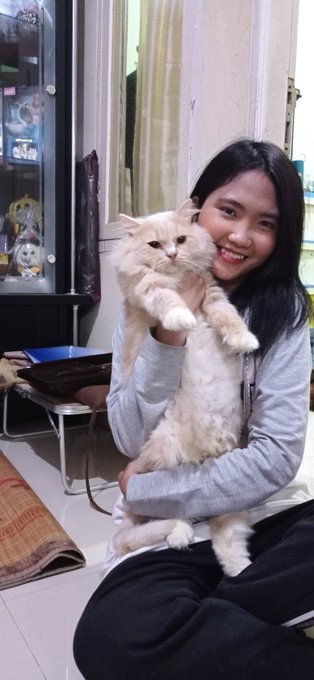Popular Reads
Top Results
Can't find what you're looking for?
View all search resultsPopular Reads
Top Results
Can't find what you're looking for?
View all search results'Twitter, Do Your Magic!’: How the mantra is restoring people's faith in humanity ... and ruining it
The catchphrase ‘Twitter, Do Your Magic!’ trending in Indonesia has helped some people help others or support a good cause, but users should beware that scammers are also using the phrase to take advantage of people's compassion and prey on the vulnerable.
Change text size
Gift Premium Articles
to Anyone
“I used ‘Twitter, Do Your Magic!’ to rescue an abused cat,” says 23-year-old Farah Dinah Rusiadi, who used the phrase last July to ask people to help a cat named “Pesek” (pug-nosed) that was being abused by its owner.
The phrase has been trending among Indonesian twitterers to ask for help via the social media app. Typically, a user tweets a post they deem particularly important and top it with the line “Twitter, Do Your Magic!” in an attempt to garner extra attention and suggest that something needs to be done.
Other users do pay attention, which frequently leads to tangible actions like crowdfunding or simple retweets that make the post go viral long enough to make a positive impact. It can indeed seem magical.
In Farah's case, she learned about the cat’s situation from an animal lovers’ group. She immediately jumped into her car and drove the 40 kilometers from Bekasi in West Java to Pademangan in North Jakarta to save the unfortunate feline.
At a veterinary clinic in Pademangan, Farah saw an emaciated 1-year-old cat that weighed only 1.3 kilograms. Pesek’s white fur had become discolored due to the poor treatment it had received. The owner stubbornly insisted that Pesek was in good hands.
“The medical bills reached Rp 4.5 million [US$310]. The owner could not afford it, said [he] would pay in installments,” recounts Farah.
Pesek’s owner later told Farah that she could take the cat home if she paid the bills. So Farah looked to some Twitter “magic”. Her post went viral and concerned users helped raise Rp 4 million.
“The vet said that Rp 4 million was fine and gave us a discount,” says Farah. A friend later adopted Pesek.
While some posts ask for nonfinancial support, such as finding a missing person or calling for blood donors, most requests look to raise money for charitable purposes.
Adi Sarwono, a 31-year-old traveling salesman, is one example. He used the phrase to raise money for a mobile library project he has been running in Bandar Lampung since 2017.
“As a salesman regularly visits remote villages, I had noticed that the children lacked access to books,” says Adi, who documents the activities of his mobile library on Busa Pustaka's official Instagram account (@busapustaka).
Pre-pandemic, Adi regularly held a reading group at the popular Lampung Elephant Park in the provincial capital. After COVID-19 emerged, he suspended the reading group and began distributing children’s books to local villages.
“Many parents lost their jobs, so I started calling for donations on Twitter. The response was extremely positive, and I managed to expand the project and begin tutoring the kids,” he says.
The children also got lessons, stationery and mobile data packages thanks to the donations.
“Not only that, there were many [Instagram] followers who ended up becoming volunteers. Several friends also began helping children in their cities to gain access to books,” says Adi.
To borrow a popular phrase, Twitter helped “restore faith in humanity” for Iman, a 23-year-old university student in Yogyakarta who has lupus and has asked to be identified by just one name.
A relative had repeatedly used his illness to run online crowdfunding campaigns. The same person had earlier run offline fundraisers, claiming that the money was to pay medical bills for Iman’s mother, who also has lupus.
“My mother and I never received a single rupiah from this person,” says Iman. “Apparently, it’s a known secret among doctors and patients that people who have serious illnesses are likely to become victims of exploitation like this, sometimes until death.”
The situation took a toll on Iman’s physical and mental health. In 2019, he began his own “Twitter, do your magic!” campaign to raise funds for his chemotherapy. He found people who genuinely wanted to help, especially among those who had undergone the treatment as well as caregivers.
Earlier this year, after noticing that his poor health and financial condition had begun to affect his studies, Iman’s friends started asking for donations to help with his university expenses.
“People really want to help,” says Iman, noting that one casual acquaintance sent donations, too.
Not always ‘magical’
But the catchphrase has also been used to scam people.
Chitra, a 38-year-old Jakartan who has asked to be identified by one name, recounted her own experience in 2019 with a man who tweeted a post containing “Twitter, Do Your Magic”.
The man claimed he was trying to raise funds for a tailor in West Java who needed a sewing machine, posting a series of tweets and pictures about the tailor and how people could help.
“I sent him a message and offered my help. He told me his plan, the price of the sewing machine and his bank account,” says Chitra.
So she transferred some money to the man’s account and shared his tweets with friends in the hope that they could help raise the money quickly.
But it was all a scam. Chitra found this out when another Twitter user revealed that the pictures were old and that another person had used them several years ago to help the tailor.
The scammer initially tried to defend himself, and then deactivated his Twitter account.
Even so, Chitra says that she will not stop helping people. It is her choice to be altruistic and the fear of being scammed will not stand in the way.
“If there is someone who actually needs help but I refuse to help them simply because I’m too scared of being scammed… that would be my sin,” she says.
But Rahan Galileo, a 35-year-old tax specialist who lives in Depok, West Java, has stopped retweeting posts that contain “Twitter, Do Your Magic!” after several unpleasant experiences with scammers.
"There are definitely [some] success stories. In my case, enough is enough,” says Rahan, who has at least 45,800 followers on his Twitter account (@glrhn).
Galih Pambudi, a 35-year-old who lives in Yogyakarta, openly criticizes the use of “Twitter, Do Your Magic!”
“We should not give any space to people with bad intentions who use sad stories to take advantage of people’s kindness,” he says, pointing out that people who really needed help would suffer as a result.
Farah, Adi and Iman, who have all used Twitter to raise funds, are all aware of the importance of accountability.
Although he often feels fatigue and a lack of focus as a result of his chronic illness, Iman says that he always tries to be open about the amount of donations he receives. Adi says his followers have never expressed suspicion about his activities, and says that anyone can visit him and his mobile library in Bandar Lampung.
On the other hand, Farah faced some cynical comments even after she demonstrated accountability and proved that she had helped Pesek.
“I don’t mind meeting [those commenters] in person to show the receipts. I’m not going anywhere,” she says.












